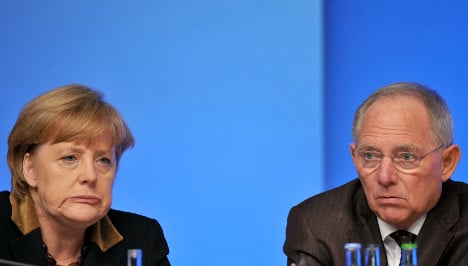In an interview with mass-circulation Bild newspaper on Friday, Schäuble said: “I think the worst is behind us.”
“The government in Athens knows that it must not overburden other eurozone
member states. Therefore it is pressing ahead with reforms,” he said.
He also expressed optimism about the pace of reform in fellow eurozone powerhouse France, saying Paris “was well aware that every country must constantly carry out reforms in order to stay competitive.”
Schäuble, 70, appeared more optimistic on what lies ahead for the eurozone than Chancellor Angela Merkel who has steadfastly refused to sound the all-clear.
Speaking after the EU picked up its Nobel Peace Prize earlier this month, Merkel said she could not “completely” declare the crisis over, describing herself as a “prudent optimist.”
In contrast, French President Francois Hollande has repeatedly said the eurozone crisis, which has at times threatened the very existence of the 17-country currency union, was past.
Turning to the German economy, the bloc’s largest, Schäuble said he was counting on “decent” growth next year, driven by trade with the United States and Asia.
“The situation is better than expected because of stronger trade with the US and Asia, among other things. The German economy will therefore grow at a decent rate in 2013,” Schäuble said.
AFP/mry



 Please whitelist us to continue reading.
Please whitelist us to continue reading.
Member comments